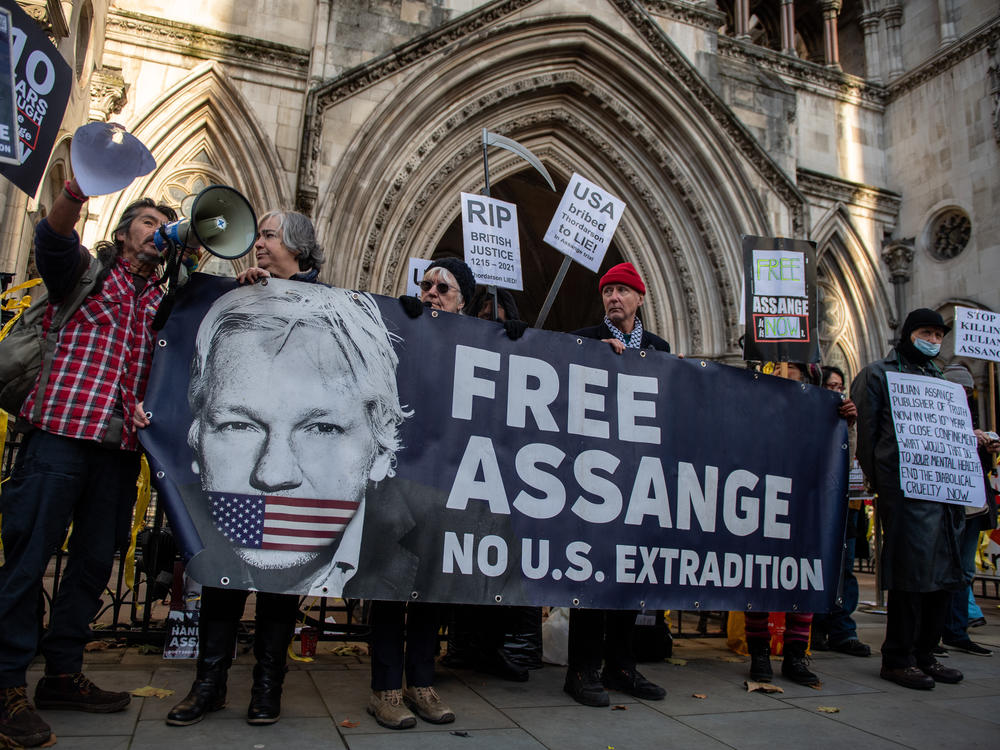Section Branding
Header Content
A court in the U.K. says Julian Assange can keep fighting his extradition to the U.S.
Primary Content
The High Court in London ruled on Monday that WikiLeaks founder Julian Assange can appeal to the U.K.'s Supreme Court against extradition to the United States, where he faces espionage charges over the publication of thousands of leaked military and diplomatic documents more than a decade ago.
Assange's lawyers have 14 days to submit their application to the Supreme Court, which will decide whether to hear the case, according to the BBC.
In December, a British appellate court opened the door to his extradition by overturning a lower court ruling that deemed his mental health too fragile to withstand the U.S. criminal justice system.
The lower court had denied extradition on health grounds, saying harsh U.S. prison conditions could lead to the deterioration of Assange's mental health, and potentially to suicide attempts. The U.S. successfully appealed after making some assurances about how it would treat the 50-year-old in custody.
"What's changed now is that following some pretty unprecedented assurances from U.S. authorities about the way he will be held in detention once he arrives in the U.S. — if he arrives in the U.S. — the High Court judges here in London have ruled that because of those assurances, they no longer have the concerns of that lower court from earlier this year," London-based journalist Willem Marx told Morning Edition in December. "And they therefore see no reason why they should not allow the U.S. to extradite him."
U.S. authorities told British judges that Assange — who is facing a maximum sentence of 175 years in prison — would be eligible to serve any time he receives in his native Australia. They also promised he wouldn't be held at the notoriously strict supermax penitentiary in Florence, Colo., or in solitary confinement.
An appeal would focus on the circumstances of those assurances
In his Monday ruling, Lord Chief Justice Ian Burnett noted that "assurances [over treatment] are at the heart of many extradition proceedings" and raised a legal question about the circumstances surrounding them — in this case, the fact that they were provided during the appeals process instead of from the outset.
"Although the law in this jurisdiction has long been settled, it does not appear that the Supreme Court has considered the question," he wrote, according to Sky News.
Assange faces 18 federal counts — 17 of espionage and one of computer misuse — in the U.S. over WikiLeaks' publication of thousands of leaked documents related to the wars in Iraq and Afghanistan. Prosecutors accuse him of conspiring with former U.S. Army intelligence analyst Chelsea Manning to compromise government computer networks and obtain and publish classified documents.
Assange has been outside of the U.S. for nearly a decade. He sequestered himself inside the Ecuadorian Embassy in London in 2012 to avoid an extradition order over a criminal inquiry in Sweden, and remained there until his expulsion in April 2019. He has been in London's Belmarsh prison ever since.
Assange's supporters cautiously welcome the ruling
Monday's ruling is being hailed as a partial victory by Assange's supporters, including his fiancée and press freedom organizations. They are applauding the court's decision to allow Assange to appeal to the Supreme Court but have long argued the charges relating to publishing government documents should be dropped altogether.
"What happened in court today is precisely what we wanted to happen," Stella Morris, Assange's fiancée, told reporters. "The High Court certified that we had raised point of law of general public importance and that the Supreme Court has good grounds to hear this appeal ... Make no mistake, we won today in court. But let's not forget that every time we win, as long as this case isn't dropped, as long as Julian isn't freed, Julian continues to suffer."
Reporters Without Borders praised the decision in a tweet, while the Committee to Protect Journalists said in a statement that it "cautiously welcomed" the ruling.
"The prosecution of the WikiLeaks founder in the United States would set a deeply harmful legal precedent that would allow the prosecution of reporters for news gathering activities and must be stopped," CPJ Deputy Executive Director Robert Mahoney said. "We strongly encourage the U.S. Justice Department to halt extradition proceedings and drop all charges against Assange."
Amnesty International went a step further, saying the High Court had certified "one narrow issue" related to the U.S.' assurances but accused it of dodging its responsibility on the issue of torture and other mistreatment in U.S. federal prisons.
"The ban on torture and other ill-treatment is absolute and cannot be upheld by simple promises from a state that it won't abuse people," said Massimo Moratti, Amnesty International's deputy research director for Europe. "The Supreme Court should have had the opportunity to deliberate and rule on all of the points of law raised by Assange at this crucially important point but the High Court has limited its scope to do so. If the question of torture and other ill-treatment is not of general public importance, what is?"
Moratti said its scope of Assange's appeal is limited by the High Court's ruling — meaning any case the Supreme Court chooses to hear will be focused on what stage in extradition hearings the requesting state should offer assurances.
This story originally appeared in the Morning Edition live blog.
Copyright 2022 NPR. To see more, visit https://www.npr.org.

